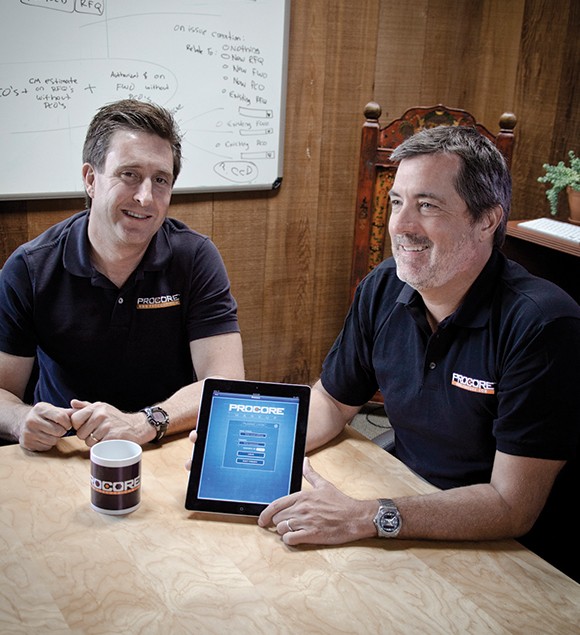Procore to build out South Coast operations with $15M Bessemer raise
IN THIS ARTICLE
- South Coast Topic
- Stephen Nellis Author
By Stephen Nellis Friday, June 20th, 2014

Procore Technologies President Steve Zahm, left, and CEO Tooey Courtemanche, in 2012 file. (Business Times file photo)
Carpinteria-based Procore Technologies, a maker of cloud-based construction management software, recently raised $15 million from the same Silicon Valley investors that have backed Yelp, LinkedIn and Skype, bringing its total funding to date to $20.5 million.
That funding will help the company expand from its existing 23,000-square-foot offices into 20,000 more square feet of space to accommodate its rapidly expanding workforce of 100.
But just three years ago, Procore had only 12 employees in a small office in Montecito. Founded in 2003 by Tooey Courtemanche, the company made cloud-based software that helped contractors, architects and their clients keep track of documents and drawings and collaborate wirelessly. For many of Procore’s customers, the software replaced what was at best a mess of emails and spreadsheets and at worst a pen and paper.
The company had been steadily growing, but the recession decimated Procore’s core customer base of builders. Procore slimmed down and focused on making its software as useful and simple as possible. It got a boost from the general popularity of the cloud and devices such as smart phones and tablets that make it easier to use its software at a construction site. The result is that since 2010, Procore’s revenue has grown by at least 100 percent every year, coming in at $4.8 million in 2012, the last year for which the company has disclosed figures.
The capital raised from Bessemer Venture Partners, which has $4 billion under management and also recently invested in San Luis Obispo-based software firm Mindbody, is earmarked for expansion.
“We’ve gotten from the point of 12 employees to 100 employees purely on retained earnings,” said President Steve Zahm. “We’ve been profitable on an annual cash basis since 2010. This isn’t a story of us needing to run on venture capital, but taking capital to accelerate our growth.”
Procore has been in the cloud since 2003, before it was really called the cloud in popular parlance. When Courtemanche moved to the South Coast, he was shocked by the pencil-and-paper process of managing the construction of his new home on the South Coast. A central hub that could be accessed from any Internet connection seemed like it could hold the key, though connectivity was sometimes a stumbling block.
“When we first started Procore, Tooey Courtemanche and I would go out and actually install WiFi to try to bring the Internet to the job site. Now, thank goodness, we don’t have to do that anymore. There’s not a job site that exists without WiFi on it,” Zahm said.
The rise of iPads have also made it easier to view things like drawings while on the go, Zahm said. Overall, the company has focused on two core audiences: big contractors who are used to clunky client-server software, and small builders who aren’t using any specialized management software at all.
The appeal of the Procore system is that it can vacuum up standard formats such as emails and PDFs and integrate them into the system, where they show up automatically. An architect, for example, doesn’t need to log into any special system to submit a plan revision to contractor. The architect can simply email it to the contractor and it shows up in the system.
In a similar vein, contractors can easily create a login account and send it to anyone who wants collaborate or stay up-to-date. If the owner of a custom-built home wants to track the construction process, he or she doesn’t need any special software. Instead, they can just go to a Web address and log in, or download a simple iPad app.
Procore has focused on ease of use, observing how contractors use the software on site. “They don’t have a whole of time to learn a new system. What we concentrate on is: ‘How can we reduce the number of clicks? How can we reduce the number of screens the user needs to go through to get a task done?’ ” Zahm said.
RobbinsReed, a San Luis Obispo based general contractor, is one of the firms using Procore. Co-founder Grant Robbins said he and his business partner came from careers in big construction firms using clunkier management software. He said mobile devices didn’t take root right away in his industry, but they’ve now become important.
“The companies that have the big platforms were slow to react. Procore was early, but they’ve moved leaps and bounds in just the past few years,” Robbins said. “The speed at which construction moves today is critical.”
RobbinsReed was started in 2007, just before the recession hit, and has experienced strong growth despite the downturn. Robbins said that Procore’s software played a role.
“It’s helped us not only compete, but it’s helped us land projects because we show clients or architects or people who would be involved how we operate and the functionality it would provide,” Robbins said. “It’s helped us a great deal with the custom-home building arm of our company.”
Procore said the funding was a Series D round. Earlier investors include Santa Barbara-based Persistence Partners, a fund formerly known as Great Pacific that includes as partners Fastclick veterans Dave Gross and Rusty Reed and Invoca co-founder Jason Spievak. It invested in Procore in late 2006.
Gross said that when the venture firm changed its name to Persistence Partners, Procore was a big part of the reason.
“This is a surviving-the-recession story, with very efficient capital raises to date,” Gross said. “The downturn in construction was possibly one of the worst impacts of the recession, and they were right in the middle of it every day. They battened down the hatches.”
Zahm said Procore intends to do most of its hiring for its Carpinteria headquarters, bringing on sales, marketing and development staff. He said construction companies can be loyal customers once won over.
“If we can get them on board as Procore clients, we might have them on board for 10 years or more,” Zahm said. “We think this is an opportunity to go out and tell the world that Procore is operating in Carpinteria.”












